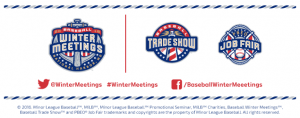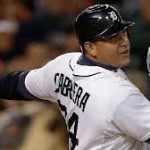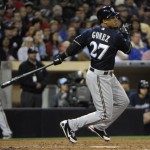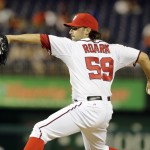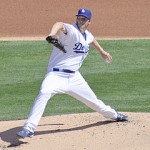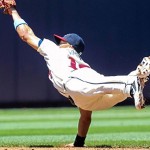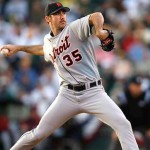As requested from Dr. Cane in the comments, lets chat about what we may see transpire at the upcoming Winter Meetings. This year’s Winter meetings are a week from now, running from Sunday 12/4/16 to 12/8/16 at the Gaylord Hotel in the National Harbor. I’m halfway curious to drive over there to witness the “scene” in the lobby/hotel bar, having read about/listened to multiple podcasts over the years describing how these meetings work. On the other hand, I’m sure I wouldn’t appreciate it if some nerd was hanging around my office while I was trying to get work done, so maybe not 🙂
In this space we’ve talked about a couple of items related to what we may see transpire in DC in the next week:
- An analysis of the roster/GM for an Off-season post
- A rule-5 prediction piece: We saw a ton of rule-5 guys protected, but none really will impact anything except the edges of the roster for 2017.
We still have some significant issues to address on the roster. How many will we see resolved at these meetings? Here’s some of the rumors (two good links: mlbtraderumors.com FA predictions and BleacherReports predictions) I’ve been hearing about as they relate to the obvious holes we have to fill; apparently the Nats and Mike Rizzo are expected to be “aggressive” this winter. I’ll take them position by position:
Center Field/Outfield
- One rumor has the Nats moving Bryce Harper to center and buying one of the big corner OF bats on the market. Jose Bautista or Brandon Moss. Josh Reddick was an early name but he got snapped up quickly. Carlos Gomez could be an interesting name.
- I’ve read that the team will splash out cash for Yoenis Cespedes and really “go for it” during the Harper window.
- Mark Zuckerman recently reported that Ben Revere basically played with a bum shoulder the whole season and the team may very well tender him and go into 2017 with him as the starter.
- I’ve heard the Nats associated with Andrew McCutchen, who may actually not be a good CF any longer, but any trade for him may be tough to do since he struggled so badly in 2016.
- Also heard that the team could be involved in trade for someone like J.D. Martinez if the Tigers attempt to re-tool their roster.
- My Take: i’m on the “move Bryce to CF” and acquire a corner bat. I’d be happy with any of these names as a way to bolster the offense.
Shortstop
- All of these CF moves assume Trea Turner returns to Short and Danny Espinosa either becomes a trade candidate or assumes the Stephen Drew utility infielder role.
- I fully support Turner back to SS; i just don’t understand those that want to keep him in Center when he’s a natural short stop and, frankly, its a heck of a lot easier to find a CF than a SS.
- My Take: I’m on the “we should trade Espinosa” boat if he’s not the starter, if only for the rumors we read about him as a clubhouse presence when he’s not playing.
Closer
- There’s three major closers on the market and more than three teams chasing them. Nats not expected to be a massive overpay … but you never know. One rumor has them on Aroldis Chapman, banking on him retaining his velocity.
- Another rumor has the Nats being more sensible and rolling the dice on a former closer like Greg Holland and then buying up a middle reliever (someone like a Brad Ziegler) to supplement the loss of several arms from this year’s bullpen.
- But there’s all sorts of middle relief arms out there. Joe Blanton may get 8 figures. Who knew.
- My Take: I like the Holland + Ziegler/Blanton route to add to our existing Kelley/Treinen/Glover trio, then add in the two lefties Solis/Perez and you have your bullpen. Kelley could be the closer if Holland can’t do it and that’d still give the team three really good 8th/9th inning arms. Replace Glover with a long-man if you want, or consider that both Perez and Blanton are former starters who could suck up innings, or be original and forgoe the darn long-man and just depend on call ups if you get a ton of innings thrown by the bullpen over a short period of time.
Catcher
- Matt Weiters to the Nats makes a lot of sense; Scott Boras client, no draft pick compensation this year.
- The team has already missed out on a couple of catchers who have gone off the board early.
- They may be looking a some trade targets.
- Clearly they’re not going to go into 2017 with just Jose Lobaton and Severino.
- Wilson Ramos seems more and more likely to be gone, perhaps a remnant of the insulting pre-injury offer they gave him, perhaps just a reality of the market for his services coming off a 2nd major knee injury. We love the Buffalo, but he may be better suited for an AL team that can DH him every once in a while, and one that can survive until July when he’s ready to go.
- My Take: I have no idea what they’ll do. But they have to do something.
I don’t really think the team needs or seeks any upgrades elsewhere, but yet we still hear weird rumors every once in a while.
- Chris Sale acquisition via trade; don’t really understand the need; yes that’d give the team three “Aces” at the top but at what cost if it requires them to gut the farm system?
- Moves to replace Werth or Zimmerman just seem silly to consider, given the payroll implications of having those two clubhouse leader/10-and-5 guys suddenly be bench bats. I don’t see this team, this manager or this executive group knee capping franchise defining players like that, especially when they’re still relatively serviceable. Werth was a 1.1 win player last year with a WRC+ figure north of 100. Zimmerman was worth negative fWAR of course, but he was hurt most of the season, so its kind of hard to gauge what he’ll do in 2017. He’s only 32 after all, and is under contract for a while longer.
Its impossible to predict trades that come out of the blue, but it is worth noting that the Nats have some surpluses of talent that they can trade from:
- I count nine starters on the 40-man roster, which means that several could be trade bait. We’ve heard rumors about Giolito, Lopez, Voth, Cole, Fedde and Gonzalez all getting packed up to move out. And that leaves out some lesser-renounded but still promising arms lower down in the system (Dunning of course, but also the likes of Avila, Baez, Watson, etc).
- There’s now TEN (10) infielders on the 40-man; I see a couple of DFAs/trades (Espinosa of course, and the loser of Skole/Robinson perhaps), and its hard to see a pathway for others (where does Marmolejos play for example?), but that’s a lot of infielders for 4 starting spots and and at most six 25-man jobs.
- We have more than a few rising quality outfielders, headed by Robles and new 40-man member Bautista, but also including the likes of Stevenson, Agustin, Wiseman, Perkins and Banks.
What do you guys see happening?
